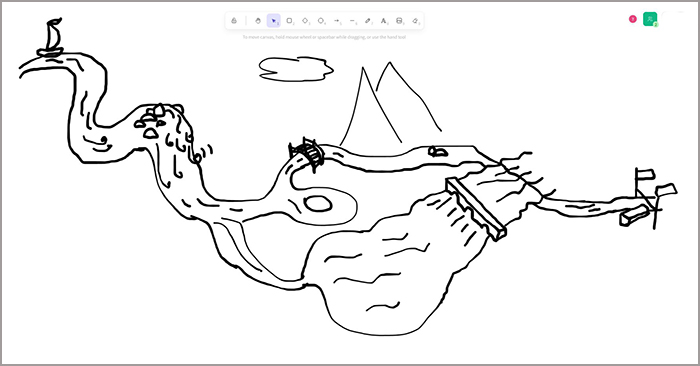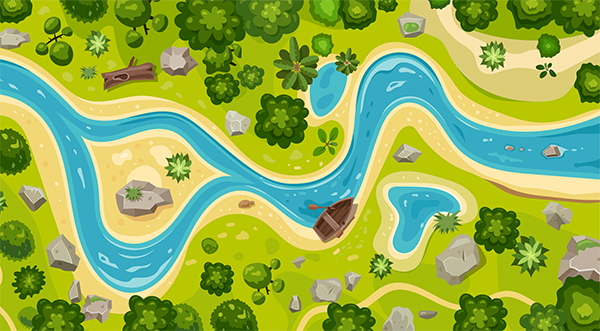Using metaphors - a method for encouraging participants to share their experiences
Presenter(s): Ryan Harries, Gil Dekel and Robert Meckin

This method encourages participants to share their experiences through use of a metaphor of a river. In a recent workshop, participants were asked to sketch their experiences of researching during COVID-19 challenges of lockdowns, risks and uncertainties, using various elements of rivers, such as meanders, waterfalls, eddies, confluences, whirlpools.[1] With these elements participants represented different episodes or events. They were able to tell each other detailed, helpful stories about their experiences, highlighting areas of confusion, anxiety, adaptation and hope. Researchers reported that it was useful to take stock and rethink their experiences graphically.
You can use this process in your workshops. There is a digital sketchpad tool to help your students with sketching (see example below), and you could also download this set of images, and upload them to the digital sketchpad. Here you can download a worksheet.

The metaphor of a river provides a common form of representation, allowing participants to compare experiences and have creative fun in the process. Below, we have grouped a few metaphors, which you can adapt and use in your class.
The Anchor
The start of any research project can be imagined as a moored boat about to start its journey. The researcher has a clear plan and objectives to meet. However, through the course, the researcher must make certain decisions in regards to literature reviews, methodology, ethics applications, and data generation. A good theoretical understanding of the field is a vital resource when anchored securely.[2] The researcher wants to select the various aspects of research (normally as early as possible) to ensure that their research will produce the expected outputs. However, COVID-19 has shown that no matter how well a researcher plans, various uncertainties will come into play during the research process. Therefore, when one commences ‘down the river of research’ one must keep in mind that the research process is iterative, dancing from uncertainty-to-certainty and back-and-forth. In a metaphorical sense, one must raise the anchor of certainty if one is to set sail on the research process.
Assess the Water
Once beginning the research journey, it is important to metaphorically ‘assess the water’. When going down or navigating a river it helps to have some prior knowledge of the environment as well as where best to set sail down the river itself. A lot of this work in research is done while ‘anchored’ safely, however, there is also a need to be vigilant of the context. One needs to ‘scan the waters’ and be tuned into the context in which the research is taking place.
Spaces in which the researcher has planned to do research can quickly change (for example, unforeseen events, such as borders closed as result of a war breaking out in Northern Ethiopia), leaving research, metaphorically, in a dried-out river.[3] A researcher needs to continuously reflect upon what the space of their research allows for, i.e., what is methodologically possible? Just like an experienced captain looks for ‘fast or slow’ moving water, obstacles, and hidden issues under the surface of the water, the researcher needs to pay attention to the context and how it is changing during research.[4]

Various Routes
Not everyone takes the same route when conducting research. For some, COVID-19 was a chance to slow down, reflect and innovate on methods. For others, COVID-19 increased the pressure to produce findings, and to rapidly find applicable methods that would render adequate results for their original project in order to retain their funding. COVID-19 forced researchers to take unfamiliar paths of research, for example, researchers had to find new ways of accessing people in environments where people were physically isolated. This emphasises the multiple, alternative ways in which research can be conducted. It is all too easy to go ‘ride’ the same route of research that one did before COVID-19. However, COVID-19 illustrates that exploring multiple routes and having increased flexibility for research methods can help research overcome obstacles. That uncertainty and flexibility can produce stimulating results along the research process.[5]
Thinking Differently
Uncertainty could encourage the researcher to mobilise resources, and think differently, be more creative, and do research in a different way. Uncertainty can allow for lessons to be learned and as a result, research can grow and innovate. The uncertainty afforded by COVID-19 emphasised the need for collaboration and for support group (‘rest stations’) where researchers help each other navigate the research, and think differently in tackling obstacles.
___
References and notes:
- STEPS Centre. (2023, March 2). Methods vignettes: Rivers of life. https://steps-centre.org/pathways-methods-vignettes/methods-vignettes-rivers-life/#:~:text=The
- For suggestions on understanding ontology, epistemology, intellectual puzzles and research paradigms, see:
Grix, J. (2002). Introducing Students to the Generic Terminology of Social Research. Politics, 22(3), 175–186. https://doi.org/10.1111/1467-9256.00173
Hammersley, M. (2013). What is Qualitative Research? Bloomsbury Academic. https://doi.org/10.5040/9781849666084
Mason, J. (2017). Qualitative researching (3rd edition). SAGE Publications.
- If the uncertainty of research is overwhelming or spaces make it epistemologically hard to do research, see Yorke et al. for advice about collaboration and drawing on the knowledge of others :
Yorke, L., Kim, J. H., Hagos Hailu, B., & Ejigu Berhie, C. (2023). Equitable North-South partnerships for ethical and policy relevant research in times of uncertainty: A collaborative autoethnography from Ethiopia. International Journal of Social Research Methodology, 1–16. https://doi.org/10.1080/13645579.2023.2173840
- For a good example of adapting research during COVID-19 see:
Nind, M., Coverdale, A., & Meckin, R. (2023). Research practices for a pandemic and an uncertain future: Synthesis of the learning among the social research community 2020–2022. International Journal of Social Research Methodology, 1–16. https://doi.org/10.1080/13645579.2023.2173842
- For an example during COVID-19 see:
Morton, K., Calman, L., Grimmett, C., Wright, D., White, H., Young, J., Radcliffe, E., & Foster, C. (2023). Ethics, rigour and agility of research and evaluation methods in a changing social and clinical context: Reflections from a psychosocial research centre on the implications of the COVID-19 pandemic. International Journal of Social Research Methodology, 1–15. https://doi.org/10.1080/13645579.2023.2173428
About the author
Robert Meckin is a doctor of Philosophy. He is a Presidential Fellow (Academic) in social Statistics, at the University of Manchester.
Gil Dekel is a doctor in Art, Design, and Media, specialising in processes of creativity and inspiration in art-making. He is an Associate Lecturer at the Open University, UK, and co-author of the ‘Energy Book’.
Ryan Harries is a current PhD student under the supervision of Dr. Robert Meckin.
- Published on: 15 May 2023
- Event hosted by: Manchester
- Keywords: Metaphors | visualisation | participation | river |
- To cite this resource:
Ryan Harries, Gil Dekel and Robert Meckin. (2023). Using metaphors - a method for encouraging participants to share their experiences. National Centre for Research Methods online learning resource. Available at https://www.ncrm.ac.uk/resources/online/all/?id=20803 [accessed: 1 January 2026]
⌃BACK TO TOP


